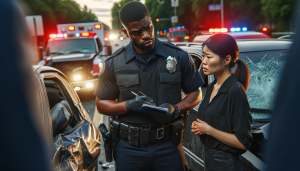Crash Course: Navigating the Legal Maze of Car Accidents
Introduction
Navigating the aftermath of a car accident can feel like being thrown into a legal maze. This article will guide you through each step, helping you understand your rights, responsibilities, and the legal processes involved. Whether you are a driver, passenger, pedestrian, or cyclist, knowing what to do and what to expect can make a significant difference in how you handle the situation.
The Immediate Steps After a Car Accident
Ensuring Safety and Seeking Medical Attention
Your utmost priority in the aftermath of a car accident is safety. Without hesitation, assess yourself and any others involved for any signs of
Injury, and if there's any doubt, promptly seek medical attention. Even seemingly minor injuries can escalate if left unchecked, underscoring the importance of consulting a medical professional. Remember, immediate medical evaluation not only safeguards your health but also ensures any underlying issues are addressed promptly.
Contacting the Authorities
Regardless of the severity of the accident, it's imperative to contact the authorities without delay. Alerting the police not only ensures the creation of an official report but also plays a pivotal role in facilitating insurance claims and legal proceedings. It's vital to provide a detailed and accurate account of the incident to law enforcement officials, as this documentation forms the basis for understanding the circumstances surrounding the accident. Cooperation with the authorities not only aids in establishing the facts but also contributes to a smoother resolution process.
Gather Information and Evidence
Exchanging Information
It's crucial to exchange contact and insurance details with all parties involved in the accident. This exchange should encompass names, addresses, phone numbers, driver’s license numbers, and insurance policy information. These details are instrumental in facilitating communication between parties and expediting the claims process.
Documenting the Scene
Documenting the scene of the accident is essential for building a comprehensive record of the incident. Take photographs capturing various angles of the accident scene, including vehicle damage, road conditions, and any visible injuries sustained. These visual records serve as invaluable evidence during insurance claims and legal proceedings. Additionally, make note of pertinent details such as the time, date, weather conditions, and any other factors that may have contributed to the accident. This thorough documentation enhances accuracy and ensures all relevant information is accounted for.

Understanding Your Rights and Responsibilities
Driver’s Legal Obligations
As a responsible driver, you bear legal obligations in the event of an accident. It's imperative to stop at the scene, render assistance as necessary, and exchange relevant information with all parties involved. Failure to fulfill these duties can lead to severe consequences, including legal penalties and potential criminal charges. By adhering to these legal obligations, you not only uphold the law but also contribute to the orderly resolution of the situation.
Passenger’s Rights
Passengers injured in
Car accidents possess certain rights to pursue compensation for their injuries and losses. They retain the option to file claims against the insurance of the at-fault driver, seeking reimbursement for medical expenses, lost
Wages, and other damages incurred. In some cases, passengers may also have recourse to their own insurance coverage for compensation. Understanding these rights empowers passengers to assert their claims and obtain the necessary assistance for recovery.
Pedestrian and Cyclist Rights
Even pedestrians and cyclists, not directly operating vehicles, are entitled to specific rights in the aftermath of
Car accidents. In instances where they sustain injuries due to the negligence of a motorist, they have the legal right to seek compensation for their damages. This includes reimbursement for medical bills, rehabilitation costs, lost income, and other related expenses. Pursuing these rights through the insurance of the at-fault driver ensures that pedestrians and cyclists receive the necessary support to recover from their ordeal and move forward.
Dealing with Insurance Companies
Reporting the Accident
Promptly informing your insurance company about the accident is essential to initiate the claims process efficiently. As soon as feasible after the incident, reach out to your insurance provider and provide them with comprehensive details regarding the accident. This should include pertinent information such as the time, date, and location of the accident, as well as a description of what transpired. Additionally, furnish any documentation requested by your insurer, such as photographs of the scene, police reports, and medical records. By promptly reporting the accident and cooperating fully with your insurance company, you facilitate the smooth processing of your claim, ensuring timely resolution and the support you need during this challenging time.
Navigating Claim Process
What to Include in Your Claim
When filing your claim, it's crucial to provide a comprehensive overview of the accident and its aftermath. This entails detailing the sequence of events leading up to the collision, including factors such as road conditions, weather, and any other pertinent circumstances. Additionally, include copies of medical reports documenting any injuries sustained in the accident, along with estimates for vehicle repairs or replacement. Any other relevant documentation, such as witness statements or police reports, should also be included to bolster your case. By being thorough and organized in compiling your claim, you can minimize the likelihood of delays and expedite the resolution process.
Common Mistakes to Avoid
In navigating the claims process, it's imperative to steer clear of certain pitfalls that could jeopardize your case. One such mistake is admitting fault or making recorded statements without first consulting a legal professional. These statements can potentially be used against you by insurance companies or opposing parties in legal proceedings, undermining your position and complicating the resolution of your claim. To safeguard your interests, it's advisable to seek guidance from a qualified attorney who can provide expert advice and representation throughout the claims process.
Determining Fault and Liability
Comparative vs. Contributory Negligence
The determination of fault in car accidents can vary depending on the state's legal framework. In states that adhere to comparative negligence, fault is apportioned among the parties involved, and compensation is adjusted accordingly based on each party's degree of fault. Conversely, states that follow contributory negligence laws may bar any compensation if the injured party is found to have contributed even minimally to the accident.
Role of Police Reports
Police reports serve as crucial documents in the aftermath of a
Car accident, playing a pivotal role in determining fault and liability. These reports offer an impartial and detailed account of the incident, often including essential information such as witness statements, officer observations, and details of any citations issued. As such, they provide valuable evidence that insurance companies and legal professionals use to assess the circumstances surrounding the accident and allocate responsibility accurately.
Impact of Witness Statements
Witness statements can significantly influence the outcome of a car accident claim by corroborating the involved parties' versions of events. These statements provide additional perspectives and firsthand accounts of the accident, bolstering the evidence available to support claims of fault and liability. It's essential to gather contact information from any witnesses present at the scene to ensure their statements can be obtained and utilized effectively in the claims process. By securing witness testimony, individuals involved in car accidents can strengthen their position and increase the likelihood of a favorable resolution.
Legal Procedures and Timelines
Filing a Police Report
In many states, filing a police report is mandatory for accidents involving
Injury, death, or significant property damage. Ensure you understand your state’s requirements.
Statute of Limitations
The statute of limitations for filing a lawsuit varies by state but is typically between one to six years. Missing this deadline can forfeit your right to seek compensation.
Filing a Lawsuit
If you cannot reach a fair settlement with the insurance company, you may need to file a lawsuit. This involves gathering evidence, filing legal documents, and potentially going to trial.
Types of Damages You Can Claim
Medical Expenses
Following a
Car accident, you're entitled to seek compensation for the extensive medical expenses incurred as a result of your injuries. This encompasses a wide range of costs, including hospital stays, surgical procedures, medications, rehabilitation therapies, and ongoing medical treatments necessitated by the accident. By meticulously documenting these expenses and providing evidence of the treatments received, you can pursue fair reimbursement for the financial burden imposed by your injuries.
If the injuries sustained in the accident prevent you from working, you have the right to claim compensation for lost
Wages. This includes reimbursement for any
Wages or salary lost during the recovery period, as well as any future earnings that may be compromised if your ability to work is permanently impaired. By demonstrating the impact of the accident on your employment and income, you can secure the financial support needed to mitigate the economic repercussions of your injuries.
Pain and Suffering
In addition to economic damages,
Car accident victims may also be entitled to compensation for the intangible harm they endure, known as pain and suffering. These damages encompass the physical pain, emotional distress, and diminished quality of life resulting from the accident and its aftermath. While quantifying these damages can be challenging, they are a vital component of ensuring that victims receive fair and just compensation for the full extent of their losses.
Property Damage
If your vehicle or personal property sustains damage in the accident, you have the right to seek compensation for the cost of repairs or replacement. This includes not only the repair expenses for your vehicle but also any damage to personal belongings or other property affected by the collision. By documenting the extent of the damage and obtaining repair estimates, you can pursue reimbursement for the financial losses incurred as a result of the accident.
The Role of Legal Representation
When to Hire a Lawyer
Consider hiring a lawyer if the accident resulted in significant injuries, disputes over fault, or complex insurance issues. Legal expertise can be crucial in navigating these complexities.

How to Choose the Right Lawyer
Questions to Ask a Potential Lawyer
When seeking legal representation for your
Car accident case, it's essential to ask pertinent questions to ensure you choose the right attorney. Start by inquiring about their experience handling car accident cases. Assessing their familiarity with this specific area of law can provide insight into their expertise and ability to navigate the complexities of your case. Additionally, inquire about their success rates in securing favorable outcomes for clients in similar situations. Understanding their track record can instill confidence in their capabilities and increase the likelihood of a successful resolution to your case.
Furthermore, it's crucial to discuss fees upfront to avoid any misunderstandings later on. Ask about their fee structure and whether they charge hourly rates or work on a contingency basis. Transparency regarding fees ensures that both parties are clear on financial expectations from the outset. Additionally, inquire about how they plan to handle your case and the approach they intend to take. Effective communication is paramount in ensuring a productive attorney-client relationship and achieving your desired objectives.
Understanding Legal Fees
In the realm of car accident cases, legal fees typically operate on a contingency basis. This means that your attorney will only receive payment if you win your case, with their fees contingent upon the outcome. This arrangement is advantageous for clients as it eliminates the financial risk of upfront legal costs and aligns the attorney's interests with yours, incentivizing them to secure the best possible outcome. However, it's essential to fully understand the fee structure before entering into any agreements. Discuss the percentage of the settlement or award that will be allocated to legal fees and any additional expenses that may arise during the course of litigation. By gaining clarity on the fee arrangement upfront, you can make informed decisions regarding your legal representation and ensure that you're comfortable with the financial terms outlined by your attorney.
Settling vs. Going to Court
Pros and Cons of Settling
Opting to settle your
Car accident case out of court offers several advantages, including expedited resolution, reduced stress, and lower costs compared to proceeding to trial. Settling allows both parties to avoid the time-consuming and emotionally draining process of litigation. However, it's essential to weigh these benefits against the potential downside of receiving a lower compensation amount than you might secure through a court verdict. Assessing the specifics of your case and consulting with your attorney can help you determine whether settling is the most favorable course of action.
What to Expect in Court
Should your case proceed to trial, you can anticipate a formal legal process involving various procedural steps. This includes jury selection, where impartial individuals are chosen to hear the case, as well as witness testimonies and the presentation of evidence by both parties. The trial culminates in a final verdict rendered by the jury or judge, determining liability and any resulting compensation. While litigation offers the opportunity for a comprehensive examination of the facts, it can also be a lengthy and emotionally taxing process, requiring careful preparation and advocacy by your legal team.
Mediation and Arbitration
Mediation and arbitration present alternative avenues for resolving car accident disputes outside of the courtroom. These methods offer a less formal and more streamlined approach to conflict resolution, often resulting in quicker resolutions and reduced costs compared to litigation. In mediation, a neutral third party facilitates negotiations between the parties to reach a mutually acceptable settlement. Arbitration involves presenting the case to a neutral arbitrator who renders a binding decision. Both mediation and arbitration provide opportunities for parties to express their concerns and work toward a resolution collaboratively, offering greater control over the outcome than traditional court proceedings.
Conclusion
Navigating the legal aftermath of a car accident can be overwhelming, but arming yourself with knowledge about your rights and the available procedures can alleviate some of the uncertainty. Knowing when to seek legal assistance and understanding the various options for dispute resolution can empower you to protect your interests and pursue the compensation you deserve. By following the steps outlined in this article and enlisting the support of experienced legal professionals, you can navigate the complexities of the legal system with confidence and secure a favorable outcome for your case.
Look for an attorney who has the right legal resources for your legal needs.
Contact us here on the
Warmuth Law website or through our hotline 888-517-9888.
Frequently Asked Questions (FAQ's)
1. What should I do immediately after a Car accident?
Immediately after a car accident, ensure the safety of yourself and others involved. Check for injuries and seek medical attention if necessary. Call the police to report the accident and provide an accurate account of the incident. Gather information and evidence, including exchanging contact and insurance details with other parties, and documenting the scene with photographs.
2. How long do I have to file a lawsuit after a Car accident?
The timeframe to file a lawsuit, known as the statute of limitations, varies by state but typically ranges from one to six years. It is crucial to check your state's specific laws to ensure you file within the allowable period. Missing the deadline can result in losing your right to seek compensation.
3. What if the other driver doesn’t have insurance?
If the other driver is uninsured, you may still have options for compensation. You can file a claim with your own insurance company if you have uninsured motorist coverage. Additionally, you might consider pursuing a
Personal injury lawsuit against the at-fault driver, though collecting damages can be challenging if they lack sufficient assets.
4. Can I still claim damages if the accident was partially my fault?
Yes, you can still claim damages even if you are partially at fault, depending on your state's laws. In comparative negligence states, your compensation may be reduced by your percentage of fault. In contributory negligence states, you may be barred from recovering any damages if you are found to be at fault to any degree.
5. How much does it cost to hire a Car accident lawyer?
Many car accident lawyers work on a contingency fee basis, meaning they only get paid if you win your case. The fee is typically a percentage of the settlement or court award, usually ranging from 25% to 40%. It is important to discuss and understand the fee structure before hiring a lawyer to ensure there are no surprises later on.













